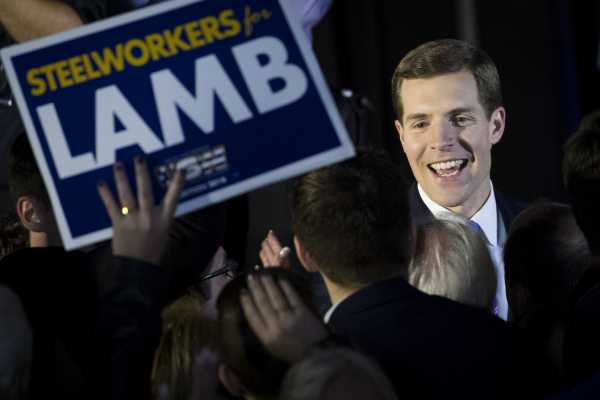
Democrat Conor Lamb’s triumph over Republican Rick Saccone in the special election for Pennsylvania’s 18th Congressional District made something abundantly clear: The best path to a Democratic House majority runs straight through the Keystone State.
That’s what I learned talking to Nick Field, the former managing editor of PoliticsPA who now writes about state politics for WHYY in Philadelphia and PennLive, the morning after the dramatic Lamb-Saccone race. Lamb performed well with suburban voters in this district near Pittsburgh but also made gains in the blue-collar parts of the district that were swinging toward the GOP. That was the winning formula, Field said.
After Lamb’s success, and when you take into account the successful lawsuit to overturn Republican gerrymandering that will require all of Pennsylvania’s congressional districts to be redrawn before the fall, Democrats are going to have a chance to pick up a lot of seats — as many as six, by Field’s counting — in a single state. (Currently, 13 of Pennsylvania’s representatives are Republicans and five are Democrats.) The minority must gain 24 seats across the whole country to take back the House.
“It’s a huge prime opportunity for Democrats. If it’s a really incredible year for them, you could swing six seats potentially,” Field told me. “If they swing six seats in Pennsylvania, you’re one-quarter of the way there in one state. I think it’s going to be a huge part of the Democrats’ midterm plan.”
Field also told me that he’s doubtful a recount, currently being contemplated by Republicans, would overturn the results — there just aren’t enough votes — and noted that with an upcoming deadline for Lamb and Saccone to run again in the fall, there might not be an appetite for a protracted fight over this special election.
“In a normal situation, I’d expect a recount,” he said. “But because of the uniqueness of having a new congressional map, and this district only existing for a few more months, we might not see that same battle.”
Read our entire conversation below, touching on why Lamb won, why the Republican message fell short, and what to expect in the fall. It has been lightly edited for clarity and length.
Dylan Scott
What are your expectations on a potential recount? There’s a lot of bluster from anonymous Republican sources this morning. Is there any reason to think the actual outcome would be up in the air?
Nick Field
I don’t think so. There aren’t that many Greene County absentee ballot votes. With Lamb’s lead at 641 votes, that’s tough to overcome.
In a normal situation, you’d think whoever was behind by a margin like that would want to have a recount because why not, maybe things could change. This one is unique because with the map changing because of the redistricting lawsuit, they have to start gathering up signatures next week. March 20 is when that starts. They have to immediately pivot to their next race.
If you’re Saccone, you have to wonder: Do I try this even though my odds are really long and fight this battle? Or do I immediately pivot to my new race in my new district? Have people soured on me too much? If I were him, I would pivot to the easier district. That’s easy to say, but I don’t know how national Republicans really feel about him.
In a normal situation, I’d expect a recount. But because of the uniqueness of having a new congressional map, and this district only existing for a few more months, we might not see that same battle.
Dylan Scott
If you were to go back and talk to yourself six months ago, even thinking of the race as a virtual tie, how shocking is what we saw last night, given the fundamentals of the district and what we would have expected when Congressman Tim Murphy announced he was going to retire?
Nick Field
I would say pretty shocking, from the kind of district that it is. I’ve written a lot about the Appalachia versus Acela parts of Pennsylvania. It’s not that simple, but it is a huge component of this district. It’s the heart of it. When Murphy dropped out, I thought this would be an example of maybe a district where Democrats will perform better than they expected, but they won’t actually capture it because it’s too much of an uphill climb.
The voter registration is still Democratic somewhat there. I went back and looked back at 2016 and the latest numbers that just came out. In Westmoreland County, Republicans have gained 20,000 voters over Democrats. In Washington, it’s 10,000. In Greene, it’s 3,000. In Allegheny, it’s 1,500. It’s similar to the last bastions of the old South, where voter registration is still Democratic but the votes have really changed there. You have all these voters, seniors or middle-aged people, Donald Trump fans, who will say that Ronald Reagan was the greatest president of all time. But they almost certainly voted for Jimmy Carter and Walter Mondale.
So the fact that Democrats won this district, even though it was by the skin of their teeth, is pretty impressive.
Dylan Scott
How would you describe the tale of last night? It seemed like Lamb performed strongly in the suburban parts of the district, where you might expect some Never Trump Republican crossover voters, and he also recaptured voters in the more blue-collar, maybe classically Democratic but Trump-supporting parts of the district.
Nick Field
I would say so. It’s a better-educated district than one might think. That might explain the outskirts of Allegheny County and how well he did there. It’s a very gerrymandered district, they cut most of the heart of Pittsburgh out of it, but he still did well in the areas outside there and improved the Democratic performance.
Winning anything in Washington and Greene, the working-class parts of the district, is impressive. He did really well with unions.
Dylan Scott
That makes me wonder about the candidates. The conventional wisdom is that Lamb was pretty effective at positioning himself as a moderate to conservative, pro-union Democrat. Saccone was a lackluster right-to-work candidate.
There is always this debate about whether fundamentals or candidates determine a race. How much do you think the candidates made a difference versus the fundamentals of the district?
Nick Field
I always feel it’s more of the fundamentals versus a national environment, more than most people. If you look at the last year in special elections, they’ve really moved toward Democrats. The whole history of midterms since the Civil War is that the minority party is going to do well.
In terms of candidates, Lamb did well. He steered clear of any controversy. They tried to pin House Democratic leader Nancy Pelosi on him, which is the classic move, and he held her at arm’s length. Maybe more than that, he pushed her away. He ran as a centrist, even as the progressives fell out of love with him over guns.
With Saccone, you would hear this feeling even late even among people in Harrisburg: I wonder why they choose him. He was the most conservative candidate. That was the narrative: They chose the most conservative candidate, and that should work. Obviously, they’ve criticized him for weak fundraising. It was difficult for him to fundraise.
So he had to spend all that outside money, whereas Lamb got the money directly and then the party silently helped him.
Dylan Scott
On the issues, there’s been a lot of coverage of how the Republican tax bill didn’t gain traction and there has been interesting polling on Lamb, who moderated himself in a lot of ways but was pretty defensive of the Affordable Care Act. Does it surprise you, or is it not all that surprising, that with this district and this electorate, the tax bill fell flat whereas health care was more resonant?
Nick Field
I think the lesson with health care is whoever the mover is on health care, whoever tries to change something, will lose. Obamacare was never popular. Conservatives hate it. A lot of progressives don’t think it goes far enough. Then as soon as Obama leaves, it starts to get popular. You try to repeal it, it gets more popular.
In terms of the tax cut, its polling was terrible as it went through, and then it started to improve. But I think it’s very easy for Democrats to say this is a tax cut for the wealthy. That was their message with the Bush tax cuts; it’s a very familiar message. I think it’s something voters would assume Republicans would do. I don’t think that’s a tough sell.
I think Republicans want that tax message to work, but the results haven’t been what they wanted.
Dylan Scott
So, of course, this district isn’t going to exist in a couple of months after redistricting. As a more mechanical matter, what is redistricting going to do to this district, and what races are we going to see in the fall when we’ve totally changed the map?
Nick Field
I think Lamb is going to run in the 17th. Saccone could very well run in the 14th. I don’t know how much this has hurt his credibility, locally and nationally. It would be something if they both run those races and they both end up serving in Congress next year. It’s a possibility.
In terms of redistricting statewide, it’s a huge, prime opportunity for Democrats. If it’s a really incredible year for them, you could swing six seats potentially.
Dylan Scott
Does last night make it seem more possible?
Nick Field
I think so. The map and the result make sure that Pennsylvania will be a central focus. If the magic number is still 24 for Democrats to take the House, if they swing six seats in Pennsylvania, you’re one-quarter of the way there in one state. I think it’s going to be a huge part of the Democrats’ midterm plan.
Dylan Scott
Are there other districts that share a profile with the 18th? Other candidates that can run on a Conor Lamb playbook?
Nick Field
I think in the more conservative areas, that’s the playbook to use. There’s that debate about where Democrats should go: to old areas where they had an advantage decades ago? Or should they look at new areas? Obviously, the answer is both areas. I think in the first instance, this is the playbook. I think most other races there won’t be as much of an uphill battle where Democrats don’t have to run as much to the middle. They can run more openly against the president.
Sourse: vox.com






